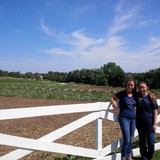Missouri
Karen Funkenbusch was an author on an article recently published in the Journal of Agromedicine: J Agromedicine. 2017 Jul 25. doi: 10.1080/1059924X.2017.1356778. [Epub ahead of print] "Keep me doing what I love": A photovoice evaluation of the Missouri AgrAbility Project." Mott R, Keller K, Funkenbusch K.
Abstract:
The Missouri AgrAbility program links the Cooperative Extension Service at a land-grant university with a nonprofit disability organization to provide practical education and assistance that promotes rural independence. This project utilized Photovoice to describe how Missouri AgrAbility clients perceived how the program impacts their lives. This article relates clients' perceptions of the impact of the AgrAbility program on their lives to the socio-ecologic model framework. Although the primary focus of AgrAbility is to help individuals who have disabilities maintain their independence, all levels of the socio-ecologic model are integral in meeting the needs of program participants.
Submitted by Karen Funkenbusch
During July 2017, Maureen Cunningham, executive director of the Brain Injury Association of Missouri, informed attendees at the Brain Injury Association of Missouri support group in Fenton about the Missouri AgrAbility Project. She also highlighted the benefits with Brain Injury Association colleagues during a networking phone call.
Submitted by Maureen Cunningham
University of Missouri-Kansas City School of Pharmacy included two student pharmacists in AgrAbility client outreach activities throughout July. Doctoral pharmacy students Tylar Pollard and Victoria Floyd, along with preceptor Kelly Cochran, provided three Pharm to Farm on-site farmstead medication assessments. Two pharmacies were visited in coordination with farmstead visits and promotional materials for Missouri AgrAbility Project, Pharm to Farm, and Missouri Rural Health Association conference were distributed and discussed. Services provided during farmstead visits included free point-of-care health screenings, disease state education, AgriSafe Health Risk Assessments, and comprehensive medication review. Health screenings provided were valued at over $300 for each farm family. Farmers were advised on safe medication practices and provided with tips for sun safety, falls prevention, provided caregiver support resources, and were advised on management of medication side effects to avoid injury. One farmer was linked back to a physician for managing his productivity-limiting condition after two years of being disconnected from care and provided with a copay card that would save an estimated $740 per month on medication.
 Pictured here, Tylar and Victoria share their background and why becoming pharmacists in rural communities is important to them:
Pictured here, Tylar and Victoria share their background and why becoming pharmacists in rural communities is important to them:
Tylar Pollard, PharmD candidate 2018, is from Independence, Missouri. She grew up participating in 4-H and showing horses. She wants to make an impact in rural healthcare because the underserved can unnecessarily suffer poorer health. She believes knowledge is power. When patients have knowledge of how their health conditions work and what the medications are supposed to do, it can lead to improved medication compliance, increased commitment to lifestyle changes, and greater confidence in the ability to manage one's own health. Tylar hopes to work in a rural community pharmacy in her future.
Victoria Floyd, PharmD candidate 2018, grew up in the small, rural town of Houston, Missouri. Coming from a community rich in hard working people, whose commitments to work and family often come before their healthcare needs, she understands the care and resources rural communities need. She has seen how limited access to quality healthcare can impact rural communities and has a desire to help bridge this gap in care. Her goal has always been to return to the rural area she grew up in to forge lasting relationships with the community and become a trusted resource of healthcare information. She will graduate from the University of Missouri-Kansas City School of Pharmacy in May 2018 and is currently exploring employment opportunities in the community pharmacy setting. In the future, she hopes to develop and implement services specific to rural communities for disease states like diabetes and hypertension to help improve patient care in her community.
Submitted by Kelly Cochran
